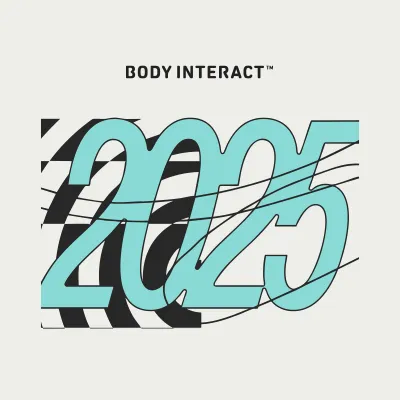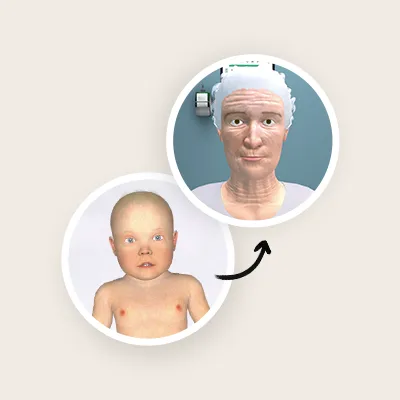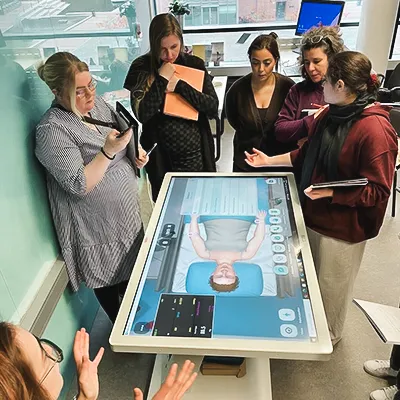Virtual Patient Simulation:
From Pre-Hospital to Outpatient
Healthcare professionals must be ready to deliver safe and effective care in many different environments. Research consistently shows that simulation-based learning enhances confidence, clinical reasoning, and decision-making across a variety of real-life situational encounters without compromising patient safety (Alrashidi et al, 2023)
With Body Interact, learners can practice in multiple real-life environments, gaining not just technical skills but also the adaptability required in real clinical practice.
Building Skills in Home Care
In home and community settings, learners practice patient assessment, health education, and early recognition of warning signs. Body Interact scenarios in living room or bedroom environments encourage students to work with limited resources, adapt to each patient’s context, and involve family members in care.
Evidence shows that simulation during community-based practice improves nursing students’ knowledge acquisition and self-efficacy, preparing them to confidently handle patients in non-clinical environments (Olaussen et al., 2022).
Competencies developed:
- Comprehensive patient history taking
- Observation and assessment in a non-clinical setting
- Patient and caregiver education

Responding in Pre-Hospital and Emergency Settings
Street and ambulance simulations challenge learners to make rapid, evidence-based decisions. They develop teamwork and prioritization skills while stabilizing the patient for safe transport to the hospital.
Studies in pre-hospital trauma training demonstrate that simulation significantly improves critical skills such as airway management, bleeding control, and patient transfer, helping learners act decisively in rare but high-risk situations (Jam et al., 2025).
Competencies developed:
- Rapid primary assessment through physical examination
- Basic life support and first aid interventions
- Communication with emergency teams

Strengthening Skills in the Hospital
Inpatient and emergency room scenarios focus on complex decision-making, collaboration, and continuous monitoring. Learners practice clinical reasoning and teamwork under realistic time pressure.
Research shows that scenario-based simulation with structured debriefing significantly enhances clinical knowledge, teamwork, and humanistic care, preparing learners to prioritize and act effectively in acute hospital settings (Chen et al., 2025).
Competencies developed:
- Prioritizing multiple patient needs
- Coordinating care with an interdisciplinary team
- Managing acute conditions and complications

Supporting Patients in Outpatient Care
Outpatient scenarios allow learners to work on preventive care, chronic disease management, and health promotion. The outpatient environment provides learners with valuable experiential learning opportunities to gain practical experience in managing chronic diseases and engaging in interprofessional collaboration (Barzegar et al, 2024).
Simulation studies highlight the role of outpatient and chronic care training in developing competencies in communication, patient-centered care, and adherence support.
Competencies developed:
- Motivational interviewing and counseling
- Planning individualized care
- Promoting adherence to treatment and healthy behaviors

Why It Matters
By training across these environments, Body Interact prepares learners to act and adapt. Evidence confirms that simulation bridges the gap between theory and practice, enhances learner confidence, and improves patient safety outcomes across care settings.
With Body Interact, learners don’t just practice clinical skills, they develop the competencies needed to provide patient-centered care wherever it is needed.
References
Alrashidi, N., Pasay an, E., Alrashedi, M.S. et al. Effects of simulation in improving the self-confidence of student nurses in clinical practice: a systematic review. BMC Med Educ 23, 815 (2023). https://doi.org/10.1186/s12909-023-04793-1
Barzegar M, Boushehri E, Amini M, Faghihi SA, Zarifsanaiey N, Daneshvar M. What Happened to Simulation-Based Education in Outpatient Setting in The 21st Century: A Scoping Review. J Adv Med Educ Prof. 2024 Apr 1;12(2):69-78. doi: 10.30476/JAMP.2023.100297.1885. PMID: 38660435; PMCID: PMC11036317.
Jam, M.B., Shahrestanaki, Y.A., Arjeini, Z. et al. Evaluating the effect of a scenario-based pre-hospital trauma management training course on the knowledge and clinical skills of emergency medical service students. BMC Emerg Med 25, 30 (2025). https://doi.org/10.1186/s12873-025-01179-y</span>
Olaussen, C., Steindal, S.A., Jelsness-Jørgensen, LP. et al. Integrating simulation training during clinical practice in nursing homes: an experimental study of nursing students’ knowledge acquisition, self-efficacy and learning needs. BMC Nurs 21, 47 (2022). https://doi.org/10.1186/s12912-022-00824-2
By Ana Santa – MSN, APRN
Editorial Manager









